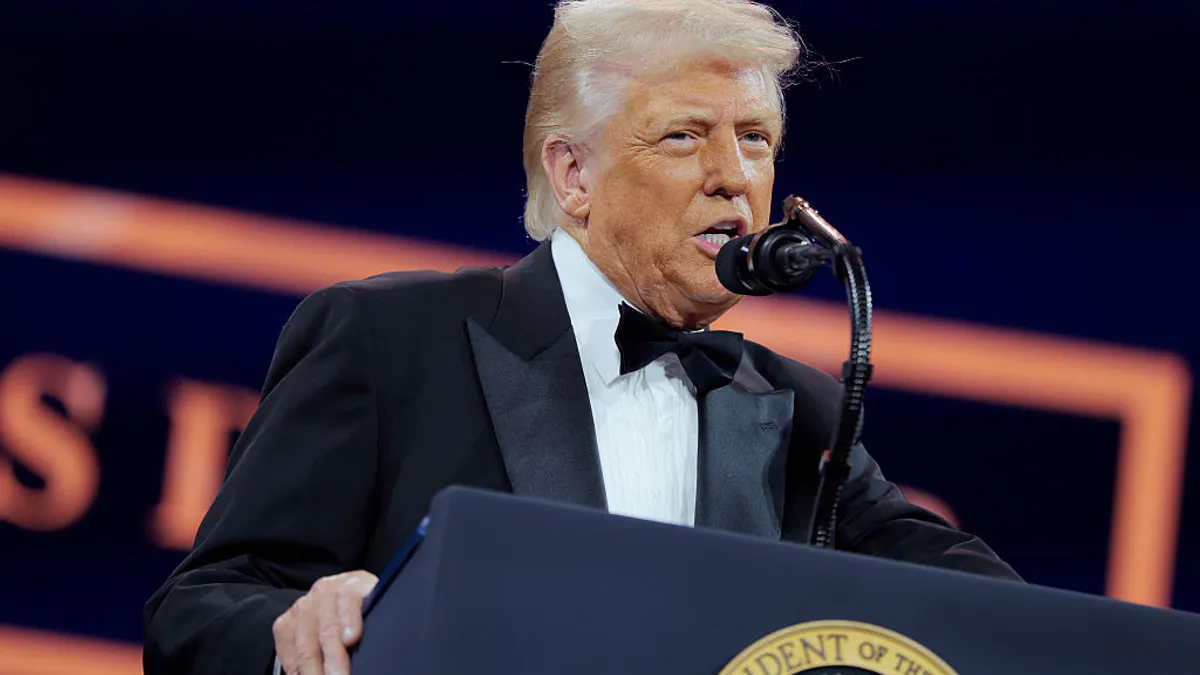Dive Brief:
- President Trump on Tuesday said he’s planning soon to announce “a major tariff on pharmaceuticals,” which were exempted from the new levies he imposed this month.
- Trump didn’t offer any details on the scope of the tariffs or the timing for the announcement, though he said it would come “very shortly.” He promised the action would spur drugmakers to leave China and other countries and move manufacturing to the U.S.
- “We’re going to tariff our pharmaceuticals,” Trump said in a speech to the National Republican Congressional Committee, the fundraising arm for the House GOP. “And once we do that, they’re going to come rushing back into our country because we’re the big market.”
Dive Insight:
Global pharmaceutical stocks plunged on the news Wednesday, with U.K.-based AstraZeneca dropping 5% and Swiss drugmaker Novartis losing 3% in early trading on U.S. exchanges. Top U.S. drugmakers, including Pfizer, Eli Lilly and Merck, also shed more than 3% of their value. The S&P 500, meanwhile, oscillated positive to negative after days of losses triggered by Trump’s earlier tariffs.
While Trump paints his tariffs as a simple equation where higher duties will prompt more U.S. manufacturing, the reality can be much more complicated. Pharmaceutical companies, like other industries, source materials from all over the world, and any changes in manufacturing would take significant time and regulatory oversight.
Though pharmaceuticals have been exempt from the tariffs announced until now, leaders in the drug industry have been bracing for their turn. “I think it’s a pivot point in U.S. policy and it feels like it’ll be hard to come back from here,” Lilly CEO David Ricks told the BBC last week. The tariffs will likely reduce the money companies spend on research and may lead to layoffs, he said.
Ricks’ take on the tariffs is significant because Lilly has announced dramatic investments in U.S. manufacturing over the last five years. Other companies are more reliant on plants overseas. Generic companies, in particular, often source their ingredients from China and India, meaning tariffs could raise the prices of usually cheap medicines such as antibiotics that are critical for health care.
In his brief remarks on the pharmaceutical tariffs, Trump zeroed in particularly on China. “What other presidents allow China to get away with is absolutely criminal,” Trump said. “But I’m not like other presidents.”
Trump is relying on presidential powers that allow him to declare tariffs in emergency situations and to address threats to national security. Critics say his actions amount to an illegal power grab. A group funded in part by conservative donor Charles Koch is taking part in a lawsuit filed by a Florida company against Trump, USA Today reported.
A group of senators led by Washington Democrat Maria Cantwell and Iowa Republican Charles Grassley is also trying to fight the tariffs. Cantwell and Grassley last week introduced a bill modeled after the War Powers Resolution of 1973, which limited a president’s ability to pursue military actions in the wake of the Vietnam War. But the bill looks unlikely to succeed in the Republican-led Congress.








